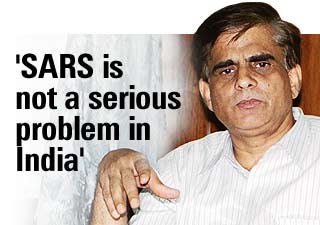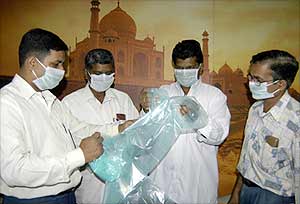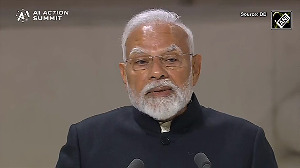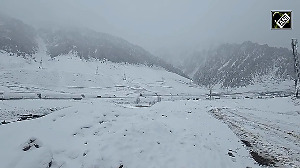
The World Health Organisations' declaration that India is a Severe Acute Respiratory Syndrome-free country, has come as a relief to India's health ministry.
Virologist Dr Akhilesh C Mishra, 52, director of the Pune-headquartered National Institute of Virology, says although India has a population of over a billion, yet it has the resilience to face any challenge like SARS.
In an interview to Michael Gonsalves, he spoke about the disease and how India was equipped to handle the infectious virus.
Why is the world witnessing the outbreak of viral infection like SARS today? How does it originate?
Man has been disturbing the ecological balance of our fragile and precious planet. The disappearance of deep forests and introduction of new irrigation systems have forced the parasites living in harmony to seek space elsewhere.
Various types of viruses have peacefully co-existed with wild animals like pigs, fouls and a variety of species for centuries. They infected humans after man encroached upon animal and bird habitats, and the viruses began migrating from animals and birds to humans. These viruses change forms, mutations occur frequently and when two viruses come together, they produce a new virus.
How prepared is India to combat SARS?
India with over 1 billion people is a vast country, yet has the resilience to face any challenge. Be it earthquakes, floods, famines, plague... our track record shows that we have a large and well-equipped infrastructure to combat SARS. The Union health ministry is coordinating with all the states. It has been networking with a vast number of hospitals, viral research institutes on a daily basis to take stock of the disease.
Federal health ministers with health secretaries have been connected with hotlines to all health related departments and research institutes. There is no need to press the panic button. What is important is that we should be vigilant and alert to any symptoms of SARS and report it to the nearest health centre or hospital.
What measures are being taken at all international airports to check its spread?

The exits of all international airports are being manned by a team of doctors along with customs officials to check passengers. Special attention is being paid to people flying into India from China, Singapore and Hong Kong where SARS has struck on a large scale.
However, any preventive system cannot be foolproof as patients may not show SARS symptoms on arrival as it happened with Stanley D'Silva, who arrived from Singapore. Only after a few days did he develop SARS. In fact, the incubation period ranges from two to ten days.
With nine (two doctors and seven paramedics at Siddharth Hospital, Pune) more positive cases in Pune, are our hospitals equipped to fight SARS?
They contracted the disease as they were all in very close contact with the confirmed cases of the D'Silva family. No one can predict from the look of it if one has contracted SARS or not. But hospital authorities need to be more careful in dealing with such cases as there is no specific treatment for SARS yet. To prevent its spread, a good mask should be used by all staff, isolation rooms should be earmarked to quarantine patients. Moreover, a keen awareness of the disease among the hospital staff would go a long way in combating SARS.
If the doctors and the paramedics had worn masks, they would not have contracted the disease?
In fact, no mask is foolproof. We are exposed to various kinds of viruses, unfortunately some turn deadly like SARS. These viruses belong to the coronavirus family which causes diarrhoea and flue-like symptoms.
The coronavirus affects humans and animals alike. In summer, viruses survive for one to three hours in the air and during winter they could survive for longer hours. With a second batch of seven to eight patients admitted as suspected SARS cases, the hospital staff is better equipped to handle the patients.
The four patients of the D'Silva family were discharged after recovery. Have they fully recovered or will the disease recur again?
No one can predict anything about SARS. The family members have recovered clinically and as per the WHO guidelines, they would be under observation for a few more days. At this moment, they need not be quarantined. How long can one keep them in isolation?
How are SARS patients treated in hospitals?
There is no specific treatment available as yet for SARS. Patients are to be treated as any other patient suffering with pneumonia, fever, cold, cough etc. But first, we isolate the patient so that the virus does not spread as it is a highly transmittable disease and the virus could also be airborne.
What are the tests carried out at NIV to confirm SARS? What samples do you take?
Our world class team of experts follows the standard Polymerase Chain Reaction test used worldwide to detect SARS. It is the best diagnostic testing tool to detect whether a patient is suffering from SARS or any other disease. Over the last 50 years, the institute has developed an array of vast expertise in identifying various viruses affecting people in various regions of the country, in hot and cold climates and in different climatic seasons.
How long does it take to confirm if a patient has developed SARS?
Once the blood, sputum and throat swab samples come to us, it takes about 24 to 36 hours to declare the results of the test as positive or negative.
What measures are taken to counter SARS?
The media has been playing an important role in disseminating critical information to the masses to create awareness. NIV has developed a document (with guidelines) which has been distributed to various public health departments, including primary health centres, for doctors to easily identify and monitor if the patient has symptoms of SARS. And the results have been encouraging.
On an average how many cases from all over India are reported to NIV for daily testing?
All the cases are referred to the director general of health services, New Delhi. [Dr Mishra did not elaborate further.]
How is India's first SARS case faring in Goa?
Prashil Varde, India's first SARS case, has completely recovered. There is no need to worry about anything.
What is the impact of SARS globally?
SARS is not a serious problem in India. So far the globally mortality rate is only 4 per cent with 20 to 30 per cent patients developing serious fever, and 60 per cent patients suffering from cough and cold.
The new virus is a serious problem no doubt, but we can neither ignore it nor suppress it like the Chinese did. We need to be ever vigilant. Currently, between 18 and 20 cases are being reported for SARS.
Is SARS a new strain?
It is a new virus and not a strain. We have yet to study its behaviour pattern under various conditions. For instance we have yet to research how it works and multiplies with what speed etc.
Is somebody using SARS as a form of bio-terrorism?
There is no evidence to suggest that. Besides, it is not so easy to produce a complicated virus causing SARS which changes its forms so frequently.
Photographs: Michael Gonsalves and Dipak Patil






 © 2025
© 2025